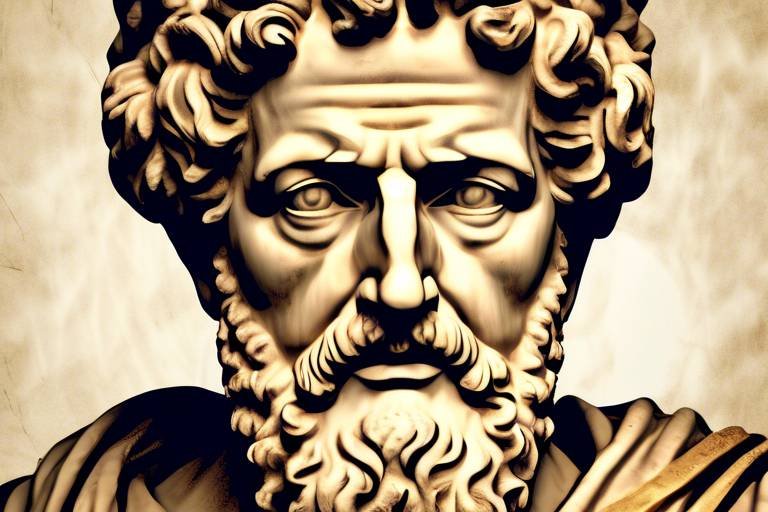Aristotle's Influence on Western Philosophy
Aristotle, a towering figure in ancient philosophy, has left an indelible mark on the landscape of Western thought. His ideas, which span various domains such as ethics, metaphysics, logic, and politics, have not only shaped the intellectual currents of his time but continue to resonate through the ages. Imagine a world where the very foundations of our understanding of existence, morality, and governance are influenced by the thoughts of a single individual. That's the power of Aristotle's contributions!
Born in 384 BC in Stagira, Greece, Aristotle was a student of Plato and later became the tutor of Alexander the Great. This unique blend of education and experience provided him with a rich context to explore the complexities of human existence. His works, which include Nicomachean Ethics, Metaphysics, and Politics, delve into profound questions that still challenge and inspire contemporary thinkers.
What makes Aristotle's influence so remarkable? For starters, he introduced the concept of empirical observation as a means of gaining knowledge, setting the stage for the scientific method that we cherish today. He believed that understanding the world around us requires careful observation and classification, a revolutionary idea at the time. This approach not only laid the groundwork for future scientific inquiry but also sparked a shift in how philosophy was practiced.
Furthermore, Aristotle's exploration of virtue ethics emphasizes the importance of character and the pursuit of the good life. He argued that true happiness, or eudaimonia, is achieved through the cultivation of virtues, which guide individuals toward moral excellence. This notion of living a virtuous life has permeated Western ethical thought, influencing philosophers from the medieval period to modern times.
In the realm of logic, Aristotle's development of formal logic, particularly the syllogism, revolutionized reasoning and argumentation. His systematic approach to deductive reasoning established a framework that remains integral to logical analysis today. This is not just a dry academic exercise; it has practical implications in everything from legal reasoning to everyday decision-making.
Aristotle’s impact extends beyond the academic; it has shaped political philosophy as well. His examination of the ideal state and the role of citizens in governance echoes in contemporary discussions about democracy and civic engagement. He categorized governments into various forms, analyzing their strengths and weaknesses, which continues to inform modern political theory.
In summary, Aristotle's influence on Western philosophy is profound and multifaceted. His ideas have not only stood the test of time but have also evolved, adapting to new contexts and challenges. The legacy of Aristotle is not merely a relic of the past; it is a living, breathing part of our intellectual heritage, inviting us to explore the depths of human understanding.
- What are Aristotle's main contributions to philosophy? Aristotle's main contributions include his work in metaphysics, ethics, logic, and political philosophy, each of which has significantly influenced Western thought.
- How did Aristotle influence modern science? By emphasizing empirical observation and classification, Aristotle laid the groundwork for the scientific method, which is essential in modern scientific inquiry.
- What is eudaimonia, according to Aristotle? Eudaimonia is often translated as "human flourishing" or "the good life," and it represents the ultimate goal of human existence in Aristotle's ethical framework.
- How is Aristotle's logic relevant today? Aristotle's syllogism and principles of deductive reasoning remain foundational in modern logic, impacting fields such as law, computer science, and everyday reasoning.

Aristotle's Life and Context
Aristotle, one of the most influential figures in Western philosophy, was born in 384 BCE in Stagira, a small town in northern Greece. His father, Nicomachus, was a physician to King Amyntas of Macedon, which likely exposed young Aristotle to the realms of science and medicine from an early age. This background may have played a crucial role in shaping his future inquiries into the natural world and the principles of life. After the death of his father, Aristotle moved to Athens at the age of seventeen to study at Plato's Academy, where he remained for about twenty years. This period was pivotal, as it not only honed his philosophical skills but also set the stage for his future disagreements with Plato, particularly regarding the nature of reality.
Aristotle's life was marked by a blend of rigorous study and practical experience. After leaving the Academy, he spent time in Asia Minor and Lesbos, where he conducted biological studies that would later inform his views on nature and life. In 343 BCE, he was invited to tutor Alexander the Great, a position that further broadened his horizons and provided him with unique insights into politics and leadership. However, it was upon his return to Athens in 335 BCE that he established his own school, the Lyceum, where he would teach and write extensively.
Understanding the historical context of Aristotle's life is essential to grasping the nuances of his philosophy. The ancient Greek world was undergoing significant changes during his lifetime, marked by the aftermath of the Peloponnesian War and the rise of Macedon. This tumultuous backdrop influenced Aristotle's thoughts on ethics, politics, and human behavior. He sought to understand the essence of human life amidst the chaos of war and shifting power dynamics. His works reflect a deep engagement with the world around him, addressing questions that were both philosophical and practical.
Aristotle's philosophy was not developed in isolation; it was a response to the ideas of his predecessors and contemporaries. His relationship with Plato was complex; while he admired Plato's intellectual rigor, he often challenged his teacher's idealism. For Aristotle, the material world was not merely a shadow of a higher reality but a subject worthy of study in its own right. This emphasis on empirical observation and tangible evidence laid the groundwork for the scientific method that would emerge centuries later.
Moreover, Aristotle's thoughts on ethics were deeply intertwined with the social and political fabric of his time. He believed that understanding the nature of the good life required an exploration of human virtues and the role of community. His insights into civic engagement and the responsibilities of citizens in governance resonate even in today’s discussions about democracy and civic duty. In essence, Aristotle's life and the context in which he lived not only shaped his philosophical inquiries but also left an indelible mark on Western thought that continues to influence various fields, from ethics to politics to science.
In summary, Aristotle's journey from a young boy in Stagira to the towering figure of Western philosophy was colored by a rich tapestry of experiences and historical events. His philosophical inquiries were a reflection of his life's journey, making his work not just theoretical but deeply practical. Understanding this context helps us appreciate the profound impact he has had on subsequent generations of thinkers.

Key Philosophical Contributions
Aristotle's philosophical contributions span a remarkable array of topics that have profoundly influenced Western thought. His insights into metaphysics, epistemology, and ethics are not just academic musings; they are foundational pillars that have shaped the way we understand reality, knowledge, and morality. Imagine standing on the shoulders of a giant—this is how many thinkers view Aristotle's legacy. His work is like a vast tapestry, intricately woven with threads of logic, virtue, and governance that continue to resonate in contemporary discussions.
In the realm of metaphysics, Aristotle pioneered the study of being and existence. He introduced concepts such as substance, essence, and potentiality versus actuality, which remain central to philosophical inquiry today. For instance, when we ponder what it means for something to exist, we are often engaging with Aristotle's ideas about the nature of reality. His definitions of primary and secondary substances have provided a framework for understanding the complexity of existence. Primary substances refer to individual entities, like a specific tree or a particular person, while secondary substances encompass the categories those entities belong to, such as 'tree' or 'human'. This distinction helps us navigate the intricate web of reality.
Moving on to epistemology, Aristotle's thoughts on knowledge and understanding are equally groundbreaking. He asserted that knowledge begins with sensory experience, which is then processed through reason. This approach laid the groundwork for the scientific method, emphasizing observation and logical reasoning as pathways to knowledge. Aristotle’s belief that all knowledge is rooted in experience invites us to consider how our perceptions shape our understanding of the world. It’s like building a house; you need a solid foundation (experience) before you can construct the walls (knowledge). His insistence on empirical evidence continues to echo in modern scientific inquiry.
When it comes to ethics, Aristotle's virtue ethics is perhaps one of his most significant contributions. He argued that the ultimate goal of human life is eudaimonia, often translated as "flourishing" or "the good life." This concept is not merely about happiness in a fleeting sense but rather about achieving a state of being that encompasses virtue, reason, and fulfillment. Aristotle proposed that living a virtuous life involves finding the golden mean—a balance between excess and deficiency. For example, courage is a virtue that lies between the extremes of recklessness and cowardice. This nuanced understanding of morality encourages individuals to cultivate virtues that contribute to personal and communal well-being.
Through his exploration of these themes, Aristotle has left an indelible mark on numerous fields, inspiring countless philosophers, scientists, and political theorists. His ideas have sparked debates and discussions that continue to this day, illustrating the timeless relevance of his work. Whether we are grappling with questions of existence, seeking knowledge, or striving for ethical living, Aristotle's contributions serve as a guiding light, illuminating the path of inquiry and understanding.
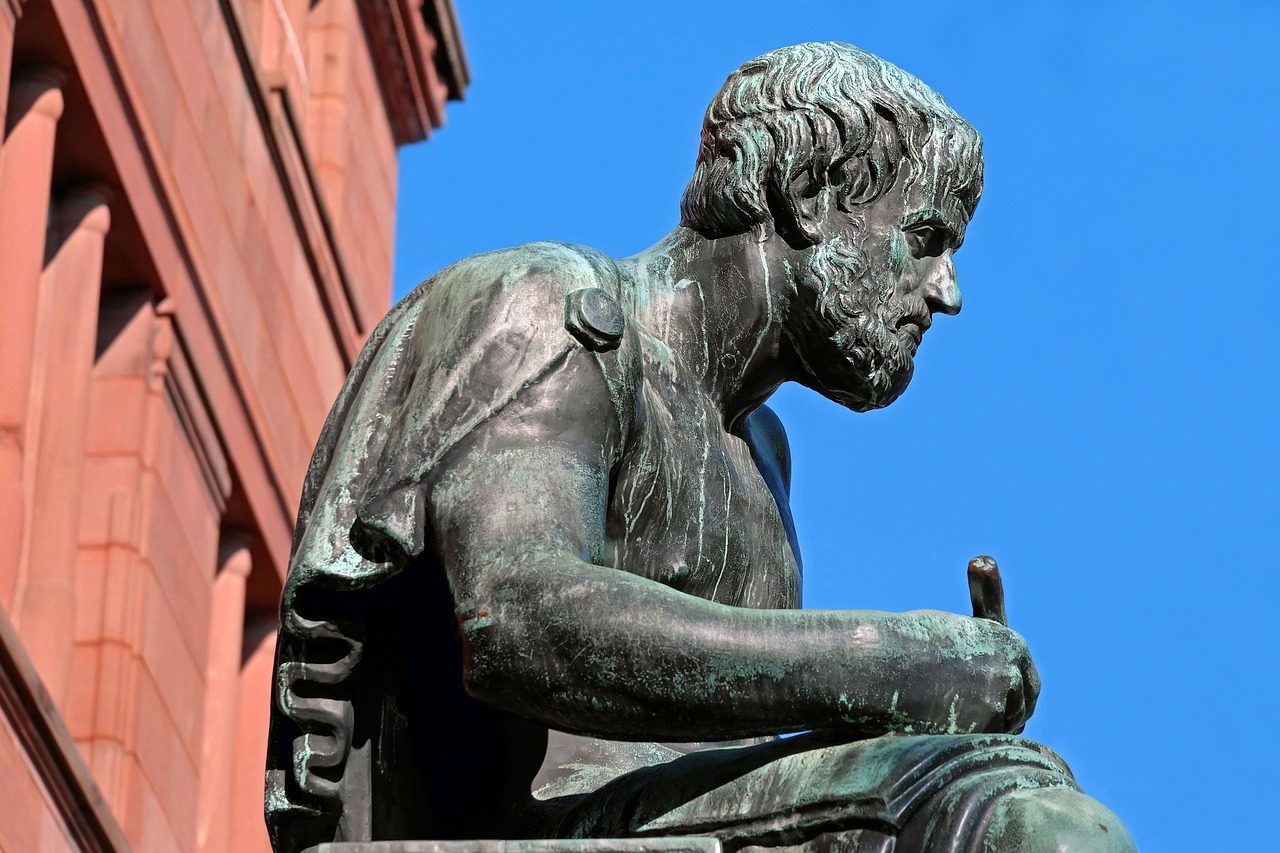
Metaphysics: The Study of Being
When we dive into the realm of metaphysics, we are embarking on a journey that questions the very fabric of existence. Aristotle, often dubbed the father of metaphysics, laid down a framework that not only seeks to understand what it means to "be" but also delves into the nature of reality itself. His exploration of being is akin to peeling an onion; each layer reveals deeper truths about the world around us. So, what exactly did Aristotle propose regarding metaphysics, and why does it matter to us today?
At the heart of Aristotle's metaphysical inquiry is the concept of substance. He argues that everything we encounter can be categorized into substances that exist independently. Imagine walking through a park: the trees, the bench, the sky—all these are substances. However, Aristotle distinguishes between two types of substances: primary substances, which are individual entities like a specific tree or a particular person, and secondary substances, which refer to the species and genera that group these individual entities together. This distinction is crucial because it sets the stage for understanding how we categorize and relate to the world.
Furthermore, Aristotle's metaphysics goes beyond mere classification; it delves into the relationship between essence and existence. Essence refers to what makes a thing what it is—its defining characteristics—while existence pertains to the fact that it is. This relationship is pivotal in Aristotle's philosophy, as it influences later discussions on the nature of reality and being. For example, consider a chair. Its essence might be defined by its function (to sit on), its material (wood, metal), and its design (four legs, a back). However, the existence of the chair is what allows it to serve its purpose in the physical world. Aristotle prompts us to ask: Can something exist without its essence? Or, does essence give rise to existence?
To further illustrate these concepts, let's consider a simple table:
| Type of Substance | Description |
|---|---|
| Primary Substance | Individual entities that exist independently (e.g., a specific dog, a unique tree). |
| Secondary Substance | Categories or groups that classify primary substances (e.g., the species 'dog', the genus 'tree'). |
Aristotle's metaphysical inquiries opened the door for countless philosophical debates and explorations. His ideas have been pivotal in shaping the thoughts of later philosophers, prompting them to grapple with the questions of existence and reality. The implications of his work are profound, influencing not just philosophy but also science, theology, and even modern existential thought.
In conclusion, Aristotle's exploration of metaphysics is not merely an academic exercise; it is a foundational inquiry that continues to resonate in contemporary discussions about the nature of reality. As we navigate our lives, understanding these concepts can enrich our perception of the world, prompting us to consider not just what exists, but why it exists and what that means for us as conscious beings. So next time you sit on a chair, think about the essence of that chair and the reality it represents. Isn’t it fascinating how something so simple can lead to such profound questions?
- What is metaphysics?
Metaphysics is a branch of philosophy that studies the fundamental nature of reality, including concepts like being, existence, and the universe. - What did Aristotle contribute to metaphysics?
Aristotle introduced key concepts such as substance, essence, and existence, which have profoundly influenced Western philosophical thought. - Why is understanding metaphysics important?
Understanding metaphysics helps us grasp the underlying principles of reality, which can inform our perspectives in philosophy, science, and daily life.

The Concept of Substance
Aristotle's conception of substance is not just a cornerstone of his metaphysical framework; it is a profound exploration into the very essence of reality itself. When we talk about substance, we are diving deep into what it means for something to exist. Aristotle distinguished between two types of substances: primary substances and secondary substances. Primary substances refer to individual entities—think of a specific tree or a particular person. These are the tangible things we can point to in our world. On the other hand, secondary substances encompass the categories or kinds to which these primary substances belong. For example, 'tree' or 'human' are secondary substances that help us classify and understand the primary substances around us.
This distinction is crucial because it allows us to navigate the complexities of existence. Imagine walking through a forest. Each tree you see is a primary substance, a unique individual. However, when you step back and think of 'trees' as a category, you're engaging with secondary substances. Aristotle's insight here is revolutionary; it suggests that to truly understand the world, we must consider both the individual entities and their broader classifications.
Furthermore, Aristotle argued that substances possess essence—the intrinsic qualities that define what they are. This essence is what differentiates one substance from another. For instance, the essence of a tree includes its ability to grow, photosynthesize, and reproduce. Without these characteristics, it would cease to be a tree. This leads us to the relationship between essence and existence, which Aristotle posited as a crucial aspect of understanding reality. In his view, the essence of a thing is what makes it what it is, while its existence is the actual manifestation of that essence in the world.
To illustrate this further, consider the following table that summarizes the distinctions Aristotle made regarding substances:
| Type of Substance | Description |
|---|---|
| Primary Substance | Individual entities (e.g., a specific dog, a particular tree) |
| Secondary Substance | Categories or kinds (e.g., 'dog', 'tree') |
In essence, Aristotle's concept of substance invites us to ponder profound questions about existence: What does it mean to be? How do we categorize the world around us? By examining substances, we gain insights not only into individual entities but also into the larger frameworks that govern our understanding of reality. This philosophical inquiry has paved the way for countless discussions and debates throughout history, influencing not just philosophy but also science and metaphysics.
In conclusion, the exploration of substance is a journey into the heart of metaphysical inquiry. It challenges us to think critically about what exists and why, laying the groundwork for future philosophical exploration. As we continue to grapple with these concepts, Aristotle's insights remain as relevant today as they were in ancient Greece, echoing through the corridors of Western thought.
- What is the difference between primary and secondary substances? Primary substances are individual entities, while secondary substances are the categories or kinds to which these entities belong.
- Why is Aristotle's concept of substance important? It helps us understand the nature of reality by distinguishing between individual entities and their classifications.
- How does essence relate to existence in Aristotle's philosophy? Essence refers to the intrinsic qualities that define a substance, while existence is the manifestation of that essence in the world.

Essence and Existence
In the realm of philosophy, few concepts are as intricate and profound as the relationship between essence and existence. Aristotle, with his keen analytical mind, delved deep into these ideas, shaping the way we understand reality itself. To grasp Aristotle's perspective, we must first define what we mean by essence and existence. Essence refers to the fundamental nature or intrinsic qualities that make an entity what it is—its defining characteristics. On the other hand, existence is simply the state of being; it is the actuality of something being present in the world.
Aristotle argued that essence precedes existence in the hierarchy of reality. This means that for something to exist, it must first have a defined essence. Think of it like a blueprint for a house: before the physical structure can be built, the design must be established. Similarly, an individual entity (like a tree, a dog, or a human) has its essence that defines what it is, and this essence is what allows it to exist in the world.
To illustrate this concept further, consider the following table that contrasts essence and existence:
| Aspect | Essence | Existence |
|---|---|---|
| Definition | Intrinsic qualities defining an entity | The state of being present in reality |
| Example | A triangle's essence includes having three sides | A specific triangle exists in the physical world |
| Philosophical Implication | Determines the nature of things | Indicates the reality of things |
Aristotle's exploration of essence and existence is not just an abstract philosophical exercise; it has real-world implications. For example, in ethics, understanding what it means to be a good person (essence) is crucial to determining how one should act (existence) in various situations. Aristotle believed that the essence of human beings is rationality, which directly informs our actions and choices in life.
Moreover, this relationship has sparked debates among philosophers for centuries. Some later thinkers, like René Descartes, took a different approach, asserting that existence is a prerequisite for essence. This divergence in thought highlights the richness and complexity of philosophical inquiry that Aristotle initiated. Ultimately, the interplay between essence and existence continues to be a vital topic in metaphysics, influencing various fields such as science, theology, and ethics.
In conclusion, Aristotle's insights into essence and existence not only laid the groundwork for future philosophical discourse but also remain relevant in contemporary discussions. By understanding the essence of things, we can better comprehend their existence and navigate the intricate tapestry of reality.
- What is the difference between essence and existence?
Essence refers to the intrinsic qualities that define what something is, while existence refers to the state of being present in the world. - How did Aristotle influence later philosophical thought?
Aristotle's ideas on essence and existence prompted further exploration and debate among philosophers, shaping metaphysics and ethics for centuries. - Why is the relationship between essence and existence important?
This relationship helps us understand the nature of reality and informs our actions and ethical decisions in life.
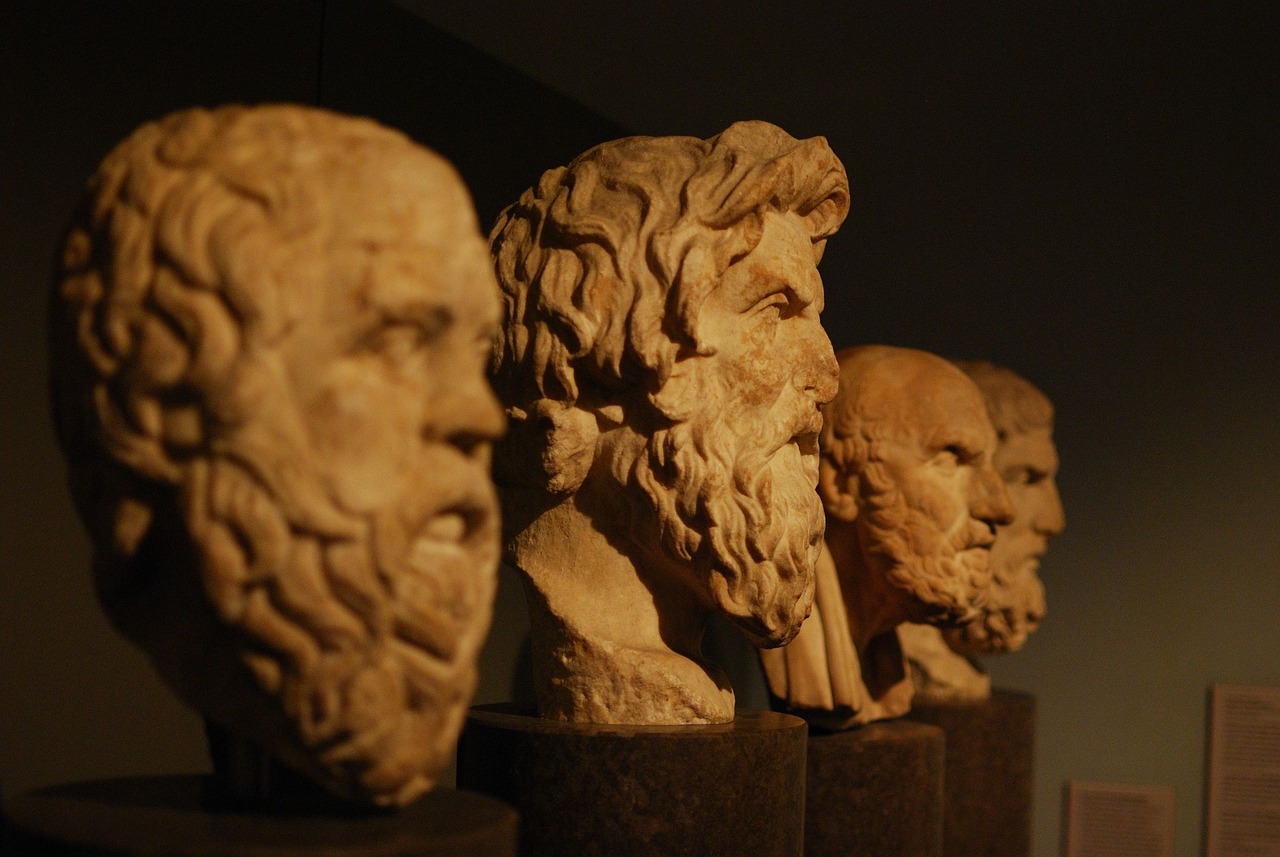
Ethics: Virtue and the Good Life
When we dive into Aristotle's ethical theories, we find ourselves in a world where the pursuit of eudaimonia—often translated as "human flourishing" or "the good life"—takes center stage. Aristotle believed that the ultimate goal of human existence is not just to exist but to live well. Imagine life as a grand journey; the destination is not merely happiness but a state of being that encompasses virtue, purpose, and fulfillment. This idea is revolutionary because it shifts the focus from mere pleasure to a deeper understanding of what it means to be truly alive.
At the heart of Aristotle's ethics lies the concept of virtue. He argued that virtues are traits of character that enable individuals to act according to reason, which is the essence of being human. Virtue is not just an abstract idea; it is about developing habits that lead to good actions. Aristotle famously categorized virtues into two types: moral virtues and intellectual virtues. Moral virtues, such as courage and temperance, are developed through practice and habit, while intellectual virtues, like wisdom and understanding, are cultivated through education and experience.
But how do we achieve this state of eudaimonia? According to Aristotle, it requires a balanced approach to life, often referred to as the Doctrine of the Mean. This doctrine suggests that virtue lies between two extremes—excess and deficiency. For instance, courage is the mean between recklessness (excess) and cowardice (deficiency). This idea resonates deeply with us: think about how we often find ourselves trying to balance our desires and responsibilities. Aristotle’s insights provide a framework for navigating life’s challenges, urging us to seek moderation in our pursuits.
Moreover, Aristotle emphasized that living a virtuous life is not just about individual attainment but also about contributing to the greater good. He proposed that community and relationships play a critical role in achieving eudaimonia. Engaging with others, fostering friendships, and participating in civic life enrich our existence. In this sense, the good life is not a solitary endeavor; it's a collective journey where our virtues shine brighter in the company of others. Aristotle believed that a good society is one where individuals strive for virtue and support each other in their quests for a fulfilling life.
In essence, Aristotle's ethical framework invites us to reflect on our values and actions continually. It challenges us to ask ourselves: Are we living virtuously? Are we contributing to our communities? By integrating Aristotle's principles into our lives, we can aspire to not only achieve our personal goals but also enhance the lives of those around us. This interconnectedness between individual virtue and societal well-being is a timeless lesson that remains relevant in today's fast-paced world.
- What is eudaimonia? Eudaimonia is often translated as "human flourishing" or "the good life," representing the ultimate goal of human existence according to Aristotle.
- What are moral virtues? Moral virtues are character traits that enable individuals to act according to reason, such as courage, temperance, and justice.
- How does the Doctrine of the Mean work? The Doctrine of the Mean suggests that virtue lies between two extremes—excess and deficiency—encouraging balance in our actions.
- Why is community important in Aristotle's ethics? Aristotle believed that living a virtuous life involves engaging with others, fostering relationships, and contributing to the common good.
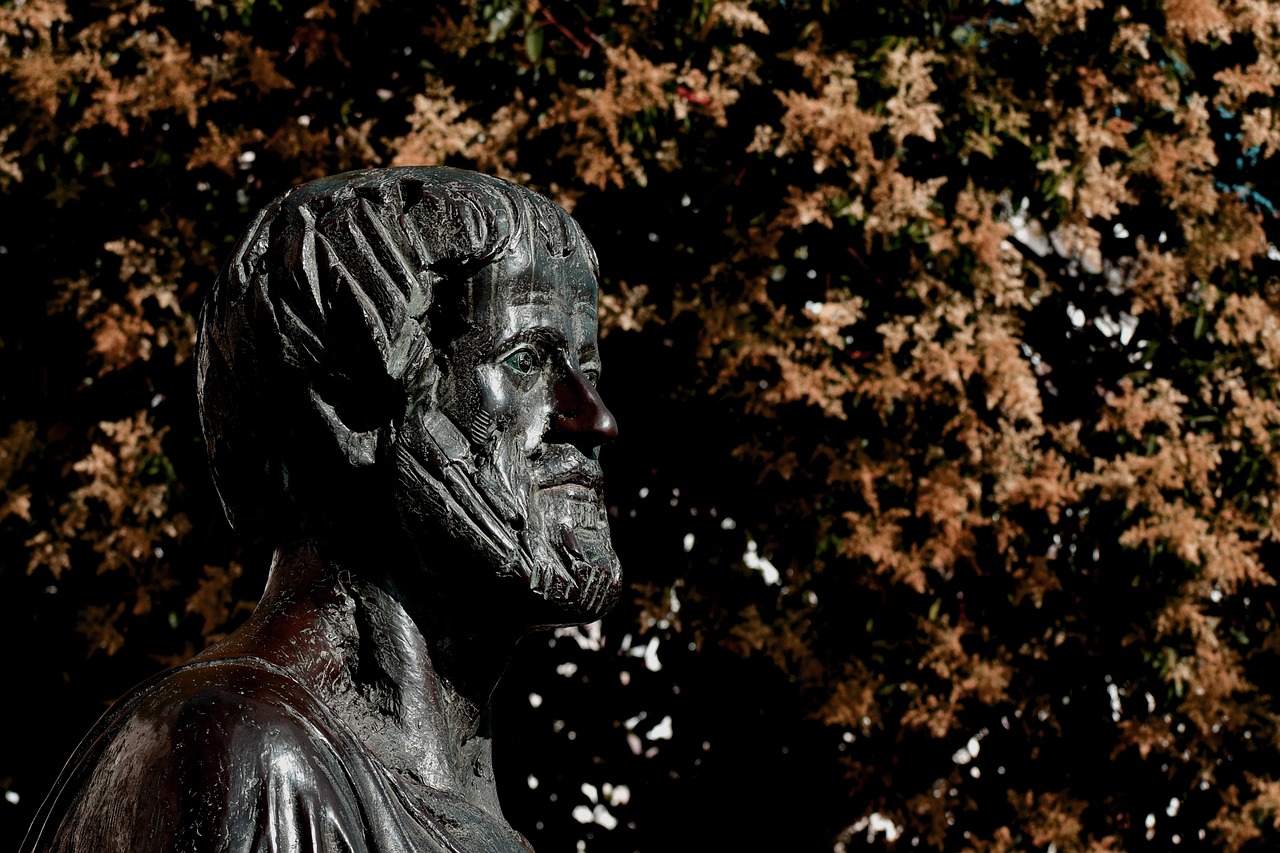
Logic: The Syllogism
When we dive into the realm of logic, Aristotle's contributions shine like a beacon. His development of the syllogism is nothing short of revolutionary, providing a structured framework for reasoning that has stood the test of time. Imagine trying to solve a puzzle without knowing what pieces fit together; that’s what reasoning was like before Aristotle introduced his logical methodologies. With the syllogism, he offered a way to connect premises to reach valid conclusions, making the process of reasoning clearer and more systematic.
At its core, a syllogism consists of a major premise, a minor premise, and a conclusion. For example, consider the following classic syllogism: All humans are mortal. Socrates is a human. Therefore, Socrates is mortal. This simple yet profound structure allows us to derive conclusions based on established truths. By breaking down arguments into these components, Aristotle not only clarified the process of logical reasoning but also paved the way for future philosophers and logicians to build upon his work.
Aristotle's principles of deductive reasoning are integral to modern logic. They provide a foundation that is still taught in classrooms today. The power of the syllogism lies in its ability to facilitate clear thinking and effective argumentation. It’s like having a map when navigating through complex ideas; it keeps us on track and helps us avoid logical fallacies that can derail our thoughts.
Furthermore, the influence of Aristotle's syllogistic logic extends beyond philosophy into various fields, including mathematics, computer science, and linguistics. In fact, many modern logical systems, such as propositional logic and predicate logic, can trace their roots back to Aristotle's original ideas. His work has inspired generations of thinkers to refine and expand upon the concepts he introduced, demonstrating the enduring relevance of his contributions.
To illustrate the structure of a syllogism, consider the following table:
| Premise Type | Example |
|---|---|
| Major Premise | All mammals are warm-blooded. |
| Minor Premise | A dog is a mammal. |
| Conclusion | Therefore, a dog is warm-blooded. |
In summary, Aristotle's exploration of logic through the syllogism has not only enriched philosophical discourse but has also had a profound impact on how we approach reasoning today. It's fascinating to think about how a simple structure can unlock the door to complex ideas and arguments. As we continue to grapple with philosophical questions and logical dilemmas, Aristotle's syllogism remains a vital tool in our intellectual toolkit.
- What is a syllogism?
A syllogism is a form of reasoning in which a conclusion is drawn from two given or assumed propositions (premises). - How did Aristotle contribute to logic?
Aristotle developed the syllogism, a systematic method of deductive reasoning that laid the groundwork for modern logic. - Why is the syllogism important?
The syllogism helps clarify arguments, making reasoning more structured and reducing the risk of logical fallacies. - Can syllogisms be used in everyday reasoning?
Absolutely! Syllogisms can help clarify thoughts and arguments in daily conversations and decision-making.

Principles of Deductive Reasoning
Aristotle's exploration of deductive reasoning is a cornerstone of his philosophical legacy, shaping not just his own work but also the very foundation of modern logic. At its core, deductive reasoning involves drawing specific conclusions from general premises, a process that can be likened to a well-crafted recipe where following the steps precisely leads to a delicious outcome. Imagine you have the ingredients (premises) and a clear recipe (logical structure); if you follow it correctly, you can confidently expect a specific result (conclusion).
One of the most significant contributions Aristotle made to deductive reasoning is the formulation of the syllogism. A syllogism is a structured argument that consists of two premises followed by a conclusion. For example:
| Premise 1 | Premise 2 | Conclusion |
|---|---|---|
| All humans are mortal. | Socrates is a human. | Socrates is mortal. |
This simple yet powerful structure illustrates how valid conclusions can be drawn if the premises are true. Aristotle emphasized that the validity of a syllogism does not depend on the truth of the premises but rather on the logical form. This distinction is crucial; it allows us to understand that even if our premises are factually incorrect, we can still arrive at a logically valid conclusion. Think of it as a game of chess: the rules of movement apply regardless of whether the pieces are real or imaginary.
Another fundamental principle of deductive reasoning that Aristotle discussed is the concept of universality. In logic, a universal statement applies to all members of a category. For example, when we state, "All birds can fly," we are making a universal claim about birds. However, Aristotle also acknowledged exceptions, pointing out that not all premises hold universally. This nuanced understanding helps us appreciate the complexity of reasoning in real-world scenarios.
Moreover, Aristotle's work on syllogisms laid the groundwork for the development of formal logic, which has evolved into a sophisticated field of study over the centuries. The principles he established are still taught in modern logic courses, underscoring his lasting influence. In contemporary discussions, deductive reasoning is often contrasted with inductive reasoning, which involves drawing general conclusions based on specific observations. While both methods are valuable, understanding their differences is vital for effective reasoning.
In summary, Aristotle's principles of deductive reasoning not only revolutionized the study of logic but also provided a systematic approach to critical thinking. His emphasis on syllogisms, universality, and the distinction between valid arguments and true premises continues to resonate in today's philosophical and scientific discourse. As we navigate the complexities of information in the modern world, these principles remain a beacon, guiding us toward clearer and more rational thought processes.
- What is deductive reasoning? Deductive reasoning is a logical process where a conclusion is drawn from general premises. If the premises are true, the conclusion must also be true.
- What is a syllogism? A syllogism is a form of reasoning in which a conclusion is drawn from two premises. It typically follows the structure of "All A are B; C is A; therefore, C is B."
- How does deductive reasoning differ from inductive reasoning? Deductive reasoning starts with general premises and moves to a specific conclusion, while inductive reasoning begins with specific observations and forms general conclusions.
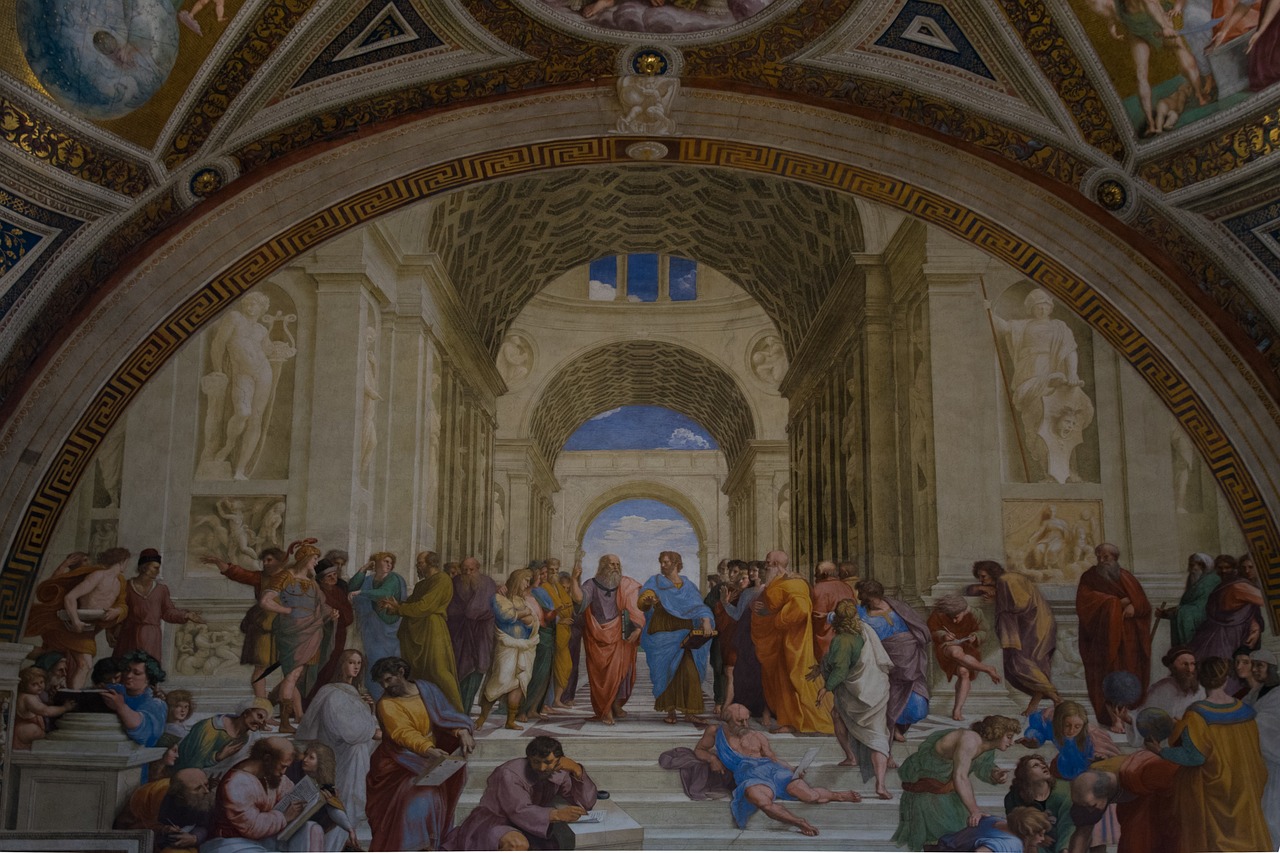
Influence on Later Logicians
Aristotle's impact on the field of logic is nothing short of revolutionary. His development of the syllogism—a structured form of reasoning—set a precedent that would echo through the ages, influencing countless philosophers and logicians. Imagine a world where reasoning is akin to a well-oiled machine; that's precisely what Aristotle provided. His work established a systematic approach to argumentation that allowed subsequent thinkers to build upon his foundations, creating a rich tapestry of logical inquiry.
One of the most significant aspects of Aristotle's influence is seen in the way he categorized logical forms. He didn't just stop at creating the syllogism; he meticulously analyzed various types of arguments, laying bare their structures. This analytical rigor inspired later logicians to further refine and expand upon his ideas. For instance, medieval scholars such as Thomas Aquinas and William of Ockham drew heavily from Aristotle's logical frameworks, integrating them into their own theological and philosophical systems.
Moreover, Aristotle's emphasis on deductive reasoning became a cornerstone of Western thought. His principles provided a clear methodology for deriving conclusions from premises, which is still taught in modern logic courses today. The clarity and precision of his logical structures can be likened to a compass guiding navigators through the often murky waters of philosophical debate.
To illustrate the breadth of Aristotle's influence, consider the following table that highlights some key logicians who were inspired by his work:
| Logician | Contribution | Relation to Aristotle |
|---|---|---|
| Thomas Aquinas | Integrated Aristotelian logic into Christian theology | Built upon Aristotle's syllogistic method |
| William of Ockham | Developed Ockham's Razor, a principle of parsimony | Utilized Aristotelian logic to critique complex explanations |
| Gottfried Wilhelm Leibniz | Proposed a universal language of reasoning | Inspired by Aristotle's systematic approach to logic |
As we delve deeper into the history of logic, we find that Aristotle's influence is not just a footnote; it is a recurring theme. His methodologies shaped the discourse of the Enlightenment, where thinkers like René Descartes and Immanuel Kant grappled with the principles of deduction and reasoning. Even the modern logical positivists owe a debt to Aristotle, as they sought to ground their philosophies in empirical evidence and logical clarity.
In summary, Aristotle's contributions to logic transcended his time, paving the way for future generations to explore and expand upon his ideas. His work is a testament to the power of clear reasoning and structured thought, serving as a beacon for those who seek to understand the complexities of human knowledge. The legacy of Aristotle in the realm of logic is not just about what he created; it's about how he inspired others to think critically and logically, forever changing the landscape of philosophical inquiry.
- What is the syllogism? The syllogism is a form of reasoning where a conclusion is drawn from two given or assumed propositions (premises). For example, "All men are mortal; Socrates is a man; therefore, Socrates is mortal."
- How did Aristotle influence modern logic? Aristotle's systematic approach to logic and reasoning laid the groundwork for modern logical analysis, influencing various fields including mathematics, computer science, and philosophy.
- Who were some key philosophers influenced by Aristotle? Notable philosophers influenced by Aristotle include Thomas Aquinas, William of Ockham, and Gottfried Wilhelm Leibniz, among others.
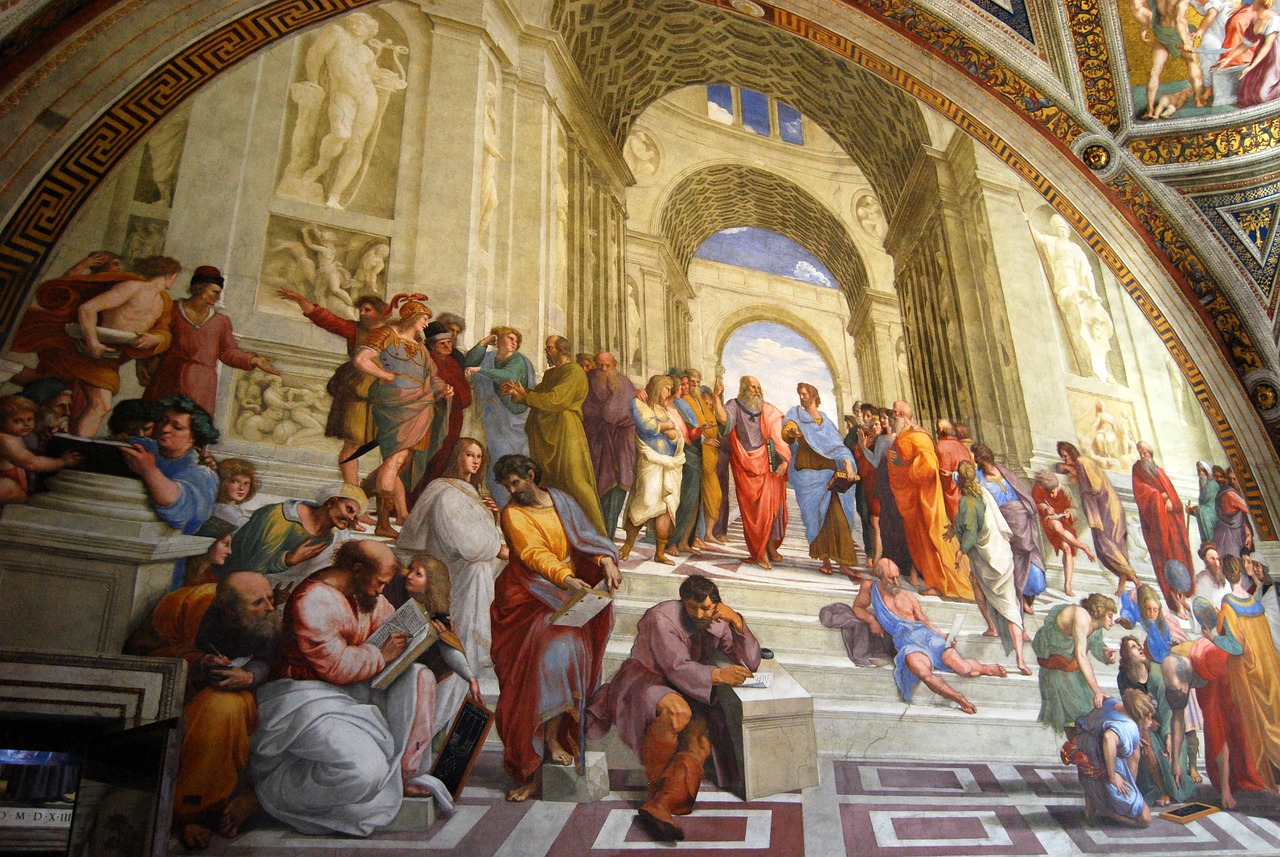
Political Philosophy: The Ideal State
Aristotle's exploration of political philosophy is nothing short of revolutionary, as he delves deep into the concept of the ideal state. His analysis is not merely theoretical; it is deeply rooted in the practical realities of governance and human nature. Aristotle believed that the purpose of the state is to promote the good life for its citizens, and this is where his ideas resonate profoundly even today. He posits that a well-structured society is essential for achieving eudaimonia, which translates to human flourishing or well-being.
One of the cornerstones of Aristotle's political thought is the idea that virtue plays a crucial role in the functioning of the state. He argued that citizens must cultivate virtues not just for personal gain but for the betterment of the community. In his view, the ideal state is one where citizens actively participate in governance, embodying the virtues that contribute to a harmonious society. This notion of civic engagement is essential, as it reinforces the connection between individual actions and the collective good.
Aristotle categorized different forms of government, analyzing their strengths and weaknesses. He identified three "good" forms of government: monarchy, aristocracy, and polity, which he viewed as the ideal versions of rule by one, few, and many, respectively. Conversely, he also discussed their corrupt counterparts: tyranny, oligarchy, and democracy. This classification is significant because it laid the groundwork for later political theory, influencing how we understand governance today.
| Type of Government | Good Form | Corrupt Form |
|---|---|---|
| Rule by One | Monarchy | Tyranny |
| Rule by Few | Aristocracy | Oligarchy |
| Rule by Many | Polity | Democracy |
Aristotle's insights into the role of citizens in governance are particularly poignant. He argued that for a state to function optimally, its citizens must not only be virtuous but also actively involved in political life. This participation fosters a sense of community and responsibility, creating a dynamic where individuals contribute to the common good. Aristotle believed that the health of the state is directly linked to the virtue of its citizens, making civic engagement a vital component of his political philosophy.
In conclusion, Aristotle's vision of the ideal state is a rich tapestry woven from the threads of virtue, civic engagement, and the pursuit of the common good. His work continues to challenge us to reflect on our roles as citizens and the impact of our actions on the broader community. As we navigate the complexities of modern governance, Aristotle's insights serve as a guiding light, urging us to strive for a society where the flourishing of individuals and the community go hand in hand.
- What is the main focus of Aristotle's political philosophy?
Aristotle's political philosophy focuses on the ideal state and the role of virtue and civic engagement in achieving the common good. - How does Aristotle categorize different forms of government?
He categorizes governments into three good forms (monarchy, aristocracy, polity) and their corrupt counterparts (tyranny, oligarchy, democracy). - Why is civic engagement important in Aristotle's ideal state?
Civic engagement is crucial because it connects individual virtue with the health of the state, promoting the common good.
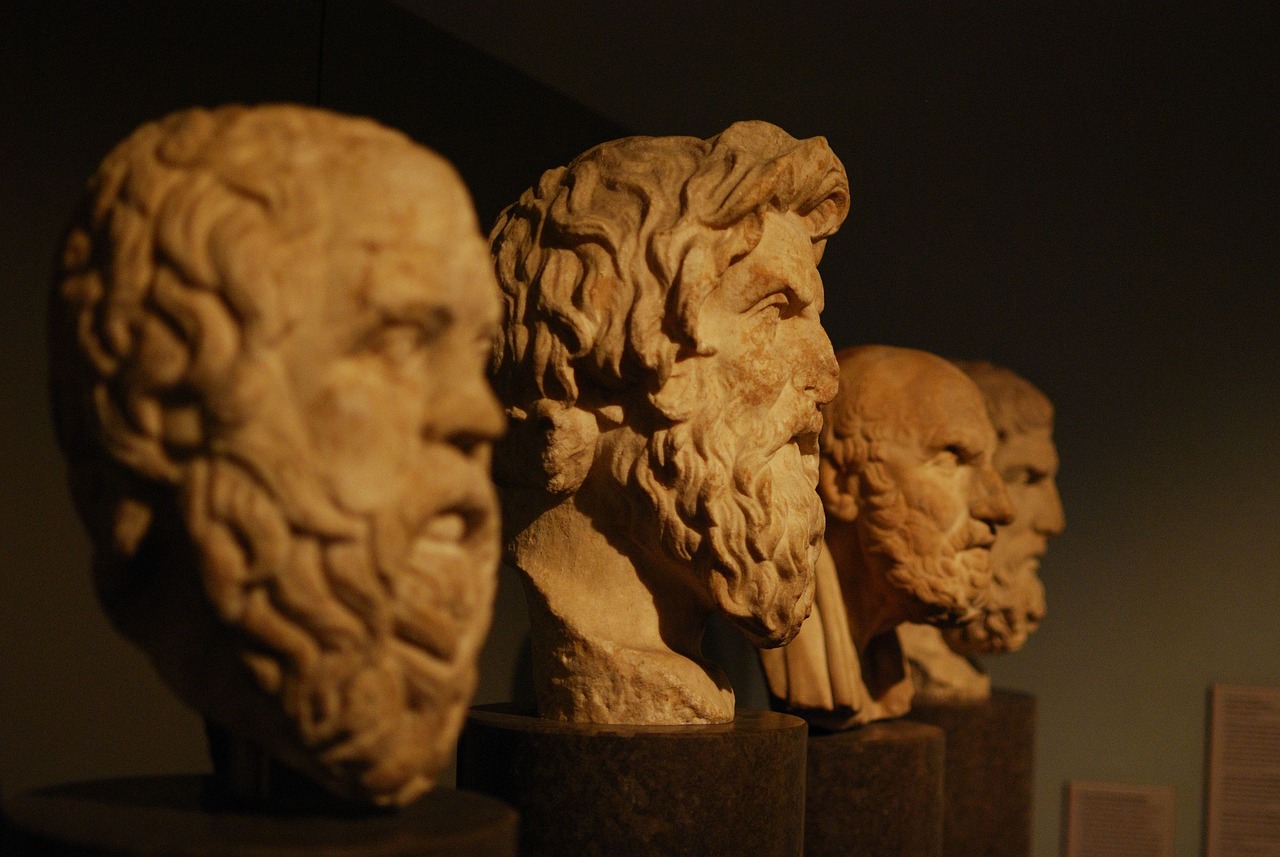
Types of Government
When we delve into Aristotle's political philosophy, we encounter his insightful categorization of government types, which remains relevant even today. Aristotle identified three primary forms of government, each with its own unique characteristics and implications for the state and its citizens. These are monarchy, aristocracy, and polity. However, he also recognized the corrupt versions of these systems: tyranny, oligarchy, and democracy. This dual classification provides a framework to analyze the strengths and weaknesses of each government type.
Aristotle believed that the ideal government is one that promotes the common good and encourages the active participation of its citizens. In his view, the legitimacy of a government is directly linked to its ability to serve the interests of the people rather than just a select few. He argued that while a monarchy can be effective when ruled by a virtuous king, it often degenerates into tyranny when power becomes concentrated in the hands of a single individual who acts out of self-interest.
To illustrate Aristotle's ideas, consider the following table that summarizes the characteristics of each government type:
| Government Type | Definition | Strengths | Weaknesses |
|---|---|---|---|
| Monarchy | Rule by a single, virtuous leader | Efficient decision-making | Potential for tyranny |
| Aristocracy | Rule by a small group of the elite | Wise governance based on knowledge | Can lead to oligarchy |
| Polity | Rule by the many, aiming for the common good | Encourages civic engagement | Risk of mob rule |
| Tyranny | Corrupt form of monarchy | Strong centralized power | Oppression of citizens |
| Oligarchy | Corrupt form of aristocracy | Stability among the elite | Neglect of the common people's needs |
| Democracy | Corrupt form of polity | High citizen participation | Potential for chaos and instability |
Aristotle's analysis doesn't stop at merely categorizing these governments; he also emphasizes the importance of virtue in governance. He argues that the best rulers are those who possess moral integrity and prioritize the welfare of their citizens. In contrast, rulers who lack virtue are likely to exploit their power for personal gain, leading to the deterioration of the state's moral fabric.
Moreover, Aristotle's insights into the role of citizens are crucial. He believed that an engaged and informed citizenry is vital for the health of the state. Citizens should not only have the right to participate in governance but also the responsibility to act virtuously and promote the common good. This concept of civic virtue is foundational to Aristotle's political philosophy and underscores the relationship between individual morality and the overall well-being of society.
In summary, Aristotle's exploration of government types provides a timeless framework for understanding political structures. His emphasis on virtue, civic engagement, and the common good continues to resonate in contemporary discussions about governance and democracy. By examining the strengths and weaknesses of each government form, we can better appreciate the complexities of political systems and the importance of ethical leadership.
- What are the three ideal types of government according to Aristotle? Aristotle identifies monarchy, aristocracy, and polity as the ideal forms of government.
- What are the corrupt forms of these governments? The corrupt forms are tyranny (monarchy), oligarchy (aristocracy), and democracy (polity).
- Why is civic engagement important in Aristotle's view? Active participation of citizens is crucial for ensuring that the government serves the common good and reflects the will of the people.
- How does Aristotle define virtue in governance? Virtue in governance refers to the moral integrity of rulers and their commitment to the welfare of the citizens.

The Role of Citizens
Aristotle believed that the health of a state is fundamentally tied to the active participation of its citizens. In his view, a thriving society is not merely a collection of individuals, but rather a community where each member plays a vital role in governance and civic life. He argued that citizens should not be passive observers but active participants in the political process. This engagement is essential for achieving the common good, which stands as the ultimate aim of any political system.
To illustrate Aristotle's perspective, consider the analogy of a well-tuned orchestra. Each musician, much like a citizen, has a unique role that contributes to the overall harmony of the ensemble. If one musician decides to play their own tune in isolation, the music becomes disjointed and chaotic. Similarly, when citizens neglect their responsibilities, the political system suffers, leading to discord and inefficiency. Therefore, Aristotle emphasized that civic engagement is not just a duty but a crucial element for the prosperity of the state.
Moreover, Aristotle categorized citizens based on their involvement in public affairs. He recognized different levels of participation, which included:
- Active Citizens: Those who engage directly in political discussions and decision-making.
- Passive Citizens: Individuals who may not participate actively but still contribute to the community through other means.
- Non-Citizens: Individuals who, for various reasons, cannot participate in governance.
In Aristotle's ideal state, every citizen would strive for virtue, understanding that their personal moral development directly impacts the community. He argued that a virtuous citizenry leads to a more just and equitable society. This belief underscores the idea that personal ethics and political engagement are intertwined. The more virtuous individuals are, the better decisions they will make for the welfare of the state.
Furthermore, Aristotle believed that education plays a pivotal role in shaping responsible citizens. He argued that a well-educated populace is crucial for fostering critical thinking and civic responsibility. By understanding their rights and duties, citizens can engage more effectively in public life, ensuring that their voices contribute to the collective decision-making process. This educational foundation is essential for nurturing informed citizens who can discern the common good and act accordingly.
In conclusion, Aristotle's vision of the role of citizens in the state is a call to action. He challenges us to recognize that our individual virtues and active participation are essential for the health of our communities. Just as an orchestra requires the harmonious contributions of each musician, a state relies on the engaged efforts of its citizens to thrive. By embracing our roles and responsibilities, we can work towards a more just and flourishing society.
- What did Aristotle believe about the role of citizens?
Aristotle believed that active participation in governance is essential for the health of the state and the achievement of the common good. - How did Aristotle categorize citizens?
He categorized citizens into active, passive, and non-citizens based on their level of involvement in public affairs. - Why is education important in Aristotle's philosophy?
Education is crucial for shaping responsible citizens who can engage effectively in public life and contribute to the common good.
Frequently Asked Questions
- What is Aristotle's main contribution to philosophy?
Aristotle's main contribution to philosophy lies in his comprehensive framework that encompasses various fields such as metaphysics, ethics, logic, and political theory. His ideas, especially on virtue ethics and the nature of being, have profoundly influenced Western thought and continue to be relevant today.
- How did Aristotle define metaphysics?
Aristotle defined metaphysics as the study of being and existence. He emphasized the importance of understanding substance, essence, and the relationship between essence and existence, which laid the groundwork for future philosophical inquiries into the nature of reality.
- What is virtue ethics according to Aristotle?
Virtue ethics, according to Aristotle, is the ethical framework that focuses on the development of good character traits (virtues) and the pursuit of eudaimonia, or human flourishing. He believed that living a virtuous life leads to true happiness and fulfillment.
- What is the syllogism and why is it important?
The syllogism is a form of deductive reasoning developed by Aristotle, consisting of a major premise, a minor premise, and a conclusion. It is important because it revolutionized logical analysis and established a structured approach to reasoning that is still used today.
- How did Aristotle categorize different forms of government?
Aristotle categorized different forms of government into three main types: monarchy, aristocracy, and polity. He analyzed their strengths and weaknesses, discussing how each form affects the common good and the role of virtue in governance.
- What role do citizens play in Aristotle's political philosophy?
In Aristotle's political philosophy, citizens play a crucial role in governance. He emphasized that active participation and civic engagement are essential for achieving the common good and maintaining a healthy state, linking individual virtue with societal well-being.









